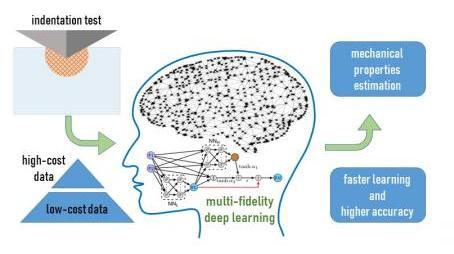Mar 17 2020
A team of researchers at Massachusetts Institute of Technology (MIT), Nanyang Technological University, Singapore (NTU Singapore), and Brown University has devised new strategies that considerably enhance the precision of a crucial material testing method by exploiting the power of machine learning.
 Scientists at Nanyang Technological University, Singapore (NTU Singapore), Massachusetts Institute of Technology (MIT), and Brown University have developed new approaches that significantly improve the accuracy of an important material testing technique by harnessing the power of machine learning. Image Credit: MIT.
Scientists at Nanyang Technological University, Singapore (NTU Singapore), Massachusetts Institute of Technology (MIT), and Brown University have developed new approaches that significantly improve the accuracy of an important material testing technique by harnessing the power of machine learning. Image Credit: MIT.
Nano-indentation is a process in which a material sample is poked with a sharp, needle-like tip to observe the way the material reacts by deforming. This process is crucial in a number of manufacturing applications, but its inability to accurately acquire certain important mechanical characteristics of material has made it less popular in the industry.
The researchers created and “'trained” the system using the typical nano-indentation process as well as feeding its experimentally quantified data, to a neural network machine learning system. This was done to predict the yield strength of samples more precisely by 20 times when compared to prevalent techniques.
The latest analytical method can potentially decrease the need for computer simulations that are both expensive and consume a great deal of time. This might ensure that the manufactured components utilized in structural applications, like automobiles and airplanes, and those produced from digital manufacturing methods, like 3D printing, are safe to be utilized in real-life conditions.
By incorporating the latest advances in machine learning with nano-indentation, we have shown that it is possible to improve the precision of the estimates of material properties by as much as 20 times. We have also validated this system's predictive capability and accuracy enhancement on conventionally manufactured aluminum alloys and 3D-printed titanium alloys.
Subra Suresh, Study Senior Corresponding Author and Distinguished University Professor, Nanyang Technological University, Singapore
Professor Suresh continued, “This points to our method’s potential for digital manufacturing applications in Industry 4.0, especially in areas such as 3D-printing.”
Professor Suresh is also the president of NTU Singapore. The study results will soon be published in the Proceedings of the National Academy of Sciences of the United States of America.
Material Benefits from a Hybrid Approach
Developed by scientists from MIT, NTU Singapore, and Brown University, the technique is a hybrid methodology that integrates advanced nano-indentation methods with machine learning.
The process involves pressing a hard tip, usually composed of a diamond-like material, within the sample material at a controlled rate with accurately calibrated force, while continuously quantifying the tip’s penetration depth into the material being deformed.
According to Upadrasta Ramamurty, a Professor at NTU Singapore, the problem emerges because the process of interpreting the experimentally quantified data is quite difficult and is presently impeding the extensive application of the nano-indentation testing method in the development of automobiles and aircraft. Professor Ramamurty also holds the President's Chair in Mechanical and Aerospace Engineering and Materials Science and Engineering at NTU Singapore.
To enhance precision in such circumstances, the research team from NTU Singapore, MIT, and Brown University created a sophisticated neural network—a kind of computing system faintly based on the human brain—and “trained” it using a combination of computer-generated data and actual experimental data.
The researchers’ “multi-fidelity” technique computes both real experimental data and computationally simulated and physics-based “synthetic” data (obtained from both three-dimensional and two-dimensional computer simulations) with deep learning algorithms.
According to Ming Dao, a principal research scientist at MIT and Visiting Professor at NTU Singapore, earlier efforts at utilizing machine learning to investigate material characteristics largely involved the use of “synthetic,” computer-generated data under unimaginable perfect conditions—for example where the movement of the indenter is flawlessly smooth and the shape of the indenter tip is impeccably sharp. Consequently, the measurements estimated by machine learning were not precise.
The researchers discovered that training the neural network first with synthetic data and subsequently integrating a comparatively small number of actual experimental data points considerably enhances the precision of the result.
The researchers also reported that the training with synthetic data can be performed beforehand, by adding an insignificant number of actual experimental results for calibration purposes, especially when assessing real materials’ properties.
The use of real experimental data points helps to compensate for the ideal world that is assumed in the synthetic data. By using a good mix of data points from the idealised and real-world, the end result is drastically reduced error.
Subra Suresh, Study Senior Corresponding Author and Distinguished University Professor, Nanyang Technological University, Singapore
Apart from Professor Subra Suresh, Professor Ming Dao, and Professor Upadrasta Ramamurty, the authors’ list includes graduate student Punit Kumar from NTU Singapore, and also Professor George Em Karniadakis and graduate student Lu Lu from Brown University.
Source: https://www.ntu.edu.sg/